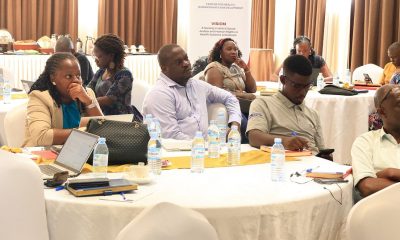Health
Stanbic Bank, NPA, UNFPA Partner to Enhance Maternal Health Ahead of World Population Day
In a collaborative effort to champion maternal health and reproductive agency, Stanbic Bank, the National Planning Authority (NPA), and the United Nations Population Fund (UNFPA) have joined forces to donate 200 “mama kits” in the lead-up to World Population Day on July 11. The announcement was made during a news conference at the Uganda Media Centre, which also served to highlight key findings from UNFPA’s 2025 State of World Population Report.
The donation of mama kits – essential supplies for safe delivery underscores a collective commitment to ensuring dignified births and healthy starts for newborns, particularly in a country where maternal mortality remains a critical concern (Uganda’s maternal mortality ratio currently stands at 189 deaths per 100,000 live births, as of April 2025 data).
John Tumwine, Head of Public Sector Client Coverage at Stanbic Bank, emphasized the bank’s dedication to Uganda’s development. “On behalf of Stanbic Bank, I’m honored to join hands today in reflecting on the state of the World Population Report. This donation is a small but significant gesture, as every mother deserves safety, and every newborn deserves a healthy start,” he stated.
Tumwine further articulated that investing in maternal health transcends mere charity; it is a strategic investment in the nation’s future. “For us, this is not charity; it’s foresight, legacy building, and a commitment to our purpose: ‘Uganda is our home, we drive her growth.’”
The event also served as a platform for the local launch of UNFPA’s 2025 State of World Population Report, titled “The Real Fertility Crisis: The Pursuit of Reproductive Agency in a Changing World.” Dr. Gift Malunga, UNFPA Representative in Uganda, highlighted a key revelation from the report: millions of people globally are unable to have their desired number of children, not due to a lack of interest in parenthood, but because of pervasive economic and social barriers.
“The real fertility crisis lies in the inability of individuals to realize their desired fertility goals due to lack of reproductive agency,” Dr. Malunga explained. The report indicates that over half of global respondents cited financial concerns as a major impediment to having children, a sentiment echoed by a UNFPA-YouGov survey in Uganda, where 39% of respondents pointed to financial limitations, particularly childcare costs, as a barrier to their desired family size.
Dr. Malunga urged governments worldwide to prioritize investments in health, education, and supportive policies that enable informed and voluntary reproductive choices, moving beyond simplistic narratives of overpopulation or underpopulation.
Mr. Tumwine expressed appreciation for the crucial roles played by NPA and UNFPA in shaping inclusive policies and translating vision into tangible impact. “Together, let us reaffirm our commitment to a Uganda where every mother delivers with dignity, and every child begins life with hope,” he concluded.
This partnership highlights the growing recognition of multi-sectoral collaboration as vital in addressing complex health and societal challenges, ensuring that every Ugandan has the opportunity to make free and informed decisions about their reproductive health and future. The donated mama kits are a tangible step in this direction, providing immediate support to mothers and newborns, and symbolizing a broader commitment to a healthier, more equitable Uganda.
Comments





























